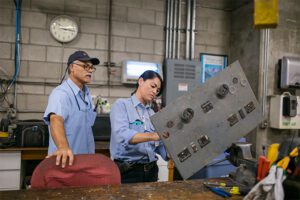At the close of the 2011 legislative session, Gov. Jerry Brown signed a number of bills relating to worker health and safety, good jobs and wage protection that put the state on a path to a stronger economy. No legislative session is perfect — and this was no exception — but it’s clear the state has come a long way under Brown’s leadership to tackling the pressing problems we face. Still, our economic problems demand even bolder solutions moving forward.
“With economic recovery the clear priority for California families, Gov. Jerry Brown moved the state in the right direction by signing into law a number of critical bills that address our deep jobs crisis and other challenges facing workers,” said California Labor Federation Executive Secretary-Treasurer Art Pulaski. “While this legislative session ended with some important strides toward a healthier economy, it also exposed just how much more needs to be done.”
The pro-worker bills Brown signed are significant. They provide a layer of protection to workers who are still struggling mightily as our economy continues to be mired in recession.
Here’s a sampling of bills Brown signed — on issues ranging from tackling the underground economy to preserving public libraries to creating jobs — that will immediately give a boost to workers and their families upon going into effect on January 1st:
SB 459 (Corbett) – Misclassification of independent contractors. There is no existing penalty in state law for employers who misclassify their employees as independent contractors to evade their obligations. This law creates significant new penalties for willful misclassification, requires violators to post a notice on their company website, holds consultants liable for advising employers to misclassify, and notifies the Contractors State Licensing Board to discipline a contractor who willfully misclassifies.
AB 22 (Mendoza) – No credit checks for employment unless related to job. Over 65% of all employers now use credit checks to screen out prospective employees, even though no research ties credit scores to work performance or trustworthiness. A worker’s credit score may suffer because they lost their job, lost their home, lost their insurance. AB 22 bars credit checks for employment purposes unless a worker’s credit history is substantially related to the job.
SB 734 (DeSaulnier) – Minimum job training requirement for federal funds. California receives nearly $500 million annually in federal Workforce Investment Act (WIA) funds, with the majority of these funds going to 49 local Workforce Investment Boards (WIBs). Not enough of these dollars are going to fund job training programs. This law requires local WIBs to invest at least 25% of public funds on quality job training programs. Starting in 2016, local WIBs would have to raise this minimum training standard to 30%.
AB 438 (Williams) – Limit library contracting out. This law restricts contracting out of library services unless specific safeguards are met, saving jobs and preserving our treasured public libraries.
SB 292 (Padilla) –LA stadium. Jobs are a top priority for Southern Californians. Los Angeles’ unemployment rate is a full percentage point higher than the state’s 12.4% rate. This bill leaves environmental standards intact while paving the way for tens of thousands of temporary and permanent living wage jobs that are expected to be created by the development of a new sports stadium in Los Angeles.
In addition to these bills, the governor signed many others that directly benefit workers.
But the fight for a better economy doesn’t stop with the end of the legislative session. In fact, it’s just beginning. Corporations still hold too much sway over our political system and our daily lives. If the Occupy Wall Street movement has taught us anything, it’s that we need to band together – in a big way – to bring power back to the people. Wage inequality, the jobs crisis and the decimation of our social safety net are the defining issues of our time.
“Working people need a bold vision from our state’s leaders on the creation of good, high-road jobs that will fuel our recovery. To achieve that, we must recommit to investing in our state’s future instead of enabling the Wall Street-led race to the bottom,” said Pulaski. “The California labor movement will work with the governor and legislative leaders in the next year and beyond to champion policies that will protect workers and restore the vitality of our state’s economy.”

